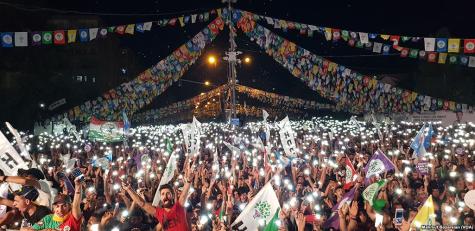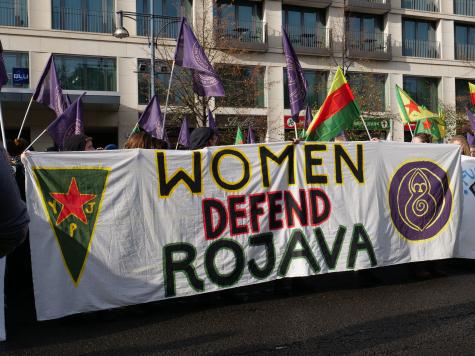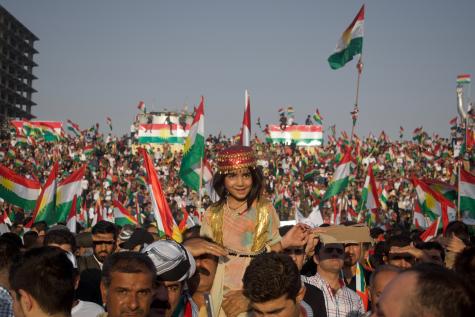Kurdistan
The POLITICAL SITUATION in KURDISTAN - History of Resistance
Kurdistan is a region associated with rich cultural heritage and a long history of struggles. Today, the nation has become a focal point for political discussions and conflict. Kurdish people primarily inhabit a mountainous region spanning across several countries in the Middle East, including Turkey, Iraq, Iran, and Syria. For decaades they have faced challenges related to statehood, identity, and self-determination.

What is the historical context of Kurdistan in Turkey?
PKK Conflict: The Kurdistan Workers' Party (PKK), founded in 1978, has been involved in a protracted armed conflict with the Turkish government. This conflict has resulted in significant casualties and instability in southeastern Turkey.
Kurdish Political Representation: Kurdish political parties have struggled for recognition and representation within Turkey's political landscape. The pro-Kurdish Peoples' Democratic Party (HDP) have played a prominent role in advocating for Kurdish rights. The party has faced challenges such as party closure, arrested members, and accusations of links to terrorism. These accusations are nothing new for Kurdish parties in the long history of Turkish politics.
Repression of the Kurdish people: There have been allegations of human right abuses, including murder and forced disappearances which have been raised by both domestic and international human rights organizations. Turkish governments have been criticized for its restrictions on freedom of expression regarding issues related to Kurdish identity, language, and culture. These abuses have resulted in the displacement of many Kurds from their homes and significant destruction to property in some Kurdish-majority areas.
What is the historical context of Kurdistan in Iraq?
Autonomous Region: Iraqi Kurdistan, is an autonomous region in northern Iraq. It has enjoyed a level of self-governance since the early 1990s. The Kurdistan Regional Government (KRG) governs this region.
Disputes with the Iraqi Government: Disagreements between the KRG and the Iraqi central government have revolved around issues like oil revenue sharing, territorial disputes, and power-sharing arrangements. The 2017 independence referendum led to a military conflict with the Iraqi central government.
What is the historical context of Kurdistan in Iran?
Kurdish Minority: Kurds in Iran face cultural and political restrictions. Some Kurdish groups have engaged in sporadic resistance against the Iranian government.
Political Activism: Kurdish political activism in Iran has revolved around cultural and identity rights, as well as calls for greater autonomy.

What is the historical context of Kurdistan in Syria?
Syrian Civil War: The Syrian Civil War has complicated the situation for Kurds in Syria. The Kurdish-led Syrian Democratic Forces (SDF) have played a key role in the fight against ISIS.
Autonomy in Northern Syria: In Northern Syria, Kurdish groups, notably the Democratic Union Party (PYD), have established self-administration and sought recognition in a complex geopolitical landscape.
What sets Rojava apart in Northern Syria?
Rojava, the Autonomous Administration of North and East Syria (AANES), stands out in northern Syria due to its distinct characteristics. Rojava's origins are rooted in the Syrian Civil War, and it is home to a diverse population including Kurds and various other ethnic groups.
Governed through democratic confederalism, Rojava emphasizes decentralized democracy and self-governance. Its structure comprises three self-administered regions, with a strong commitment to gender equality and women's empowerment. The Syrian Democratic Forces (SDF), primarily led by the Kurdish People's Protection Units (YPG) played a pivotal role in combating ISIS. Rojava encourages coexistence among diverse communities, fosters Kurdish cultural revival, and champions multilingual education. Women's participation in governance is actively promoted through women's communes.
Rojava's journey is marred by the ongoing Syrian conflict, resulting in intermittent instability. Complex geopolitics heavily influence the region's future.

What are the geopolitical factors and challenges for Kurdistan?
Kurdistan's political situation is heavily influenced by regional and international factors including neighboring countries, global powers, and non-state groups, who all have interests in the region.
Understanding the political situation in Kurdistan requires a nuanced perspective, considering historical context, local dynamics, and international influences. It's essential to stay updated on the evolving situation, as developments can have significant implications for regional stability and the Kurdish people's aspirations for self-determination and rights.
Our platform on Kurdistan provides general information, news portals, details of the organizations which are active in the region. Comprehensive information about Rojava, and resources on the PKK/Abdullah Öcalan can also be found in the same section. Be sure to check out our recommended news media from Kurdistan, as well as our comprehesive guide to the human rights siutation in the country.
Licensed under CC BY-NC-ND 4.0 Updated by Rachael 02.04.24
For further reading on Kurdistan see below ⬇️
Info on Kurdistan
- Kurdistan Solidarity[6]
- Rojava Solidarity[118]
- News[11]
- Links[9]
- The Illisu-Dam
- General Info[19]
- Organizations[18]
- Independence Referendum 2017[23]
- PKK / Ocalan[109]
- The New War (2007)[8]
- Halabja - March 16, 1988[33]
- Human Rights Abuses by Turkey
- Selected Articles[73]